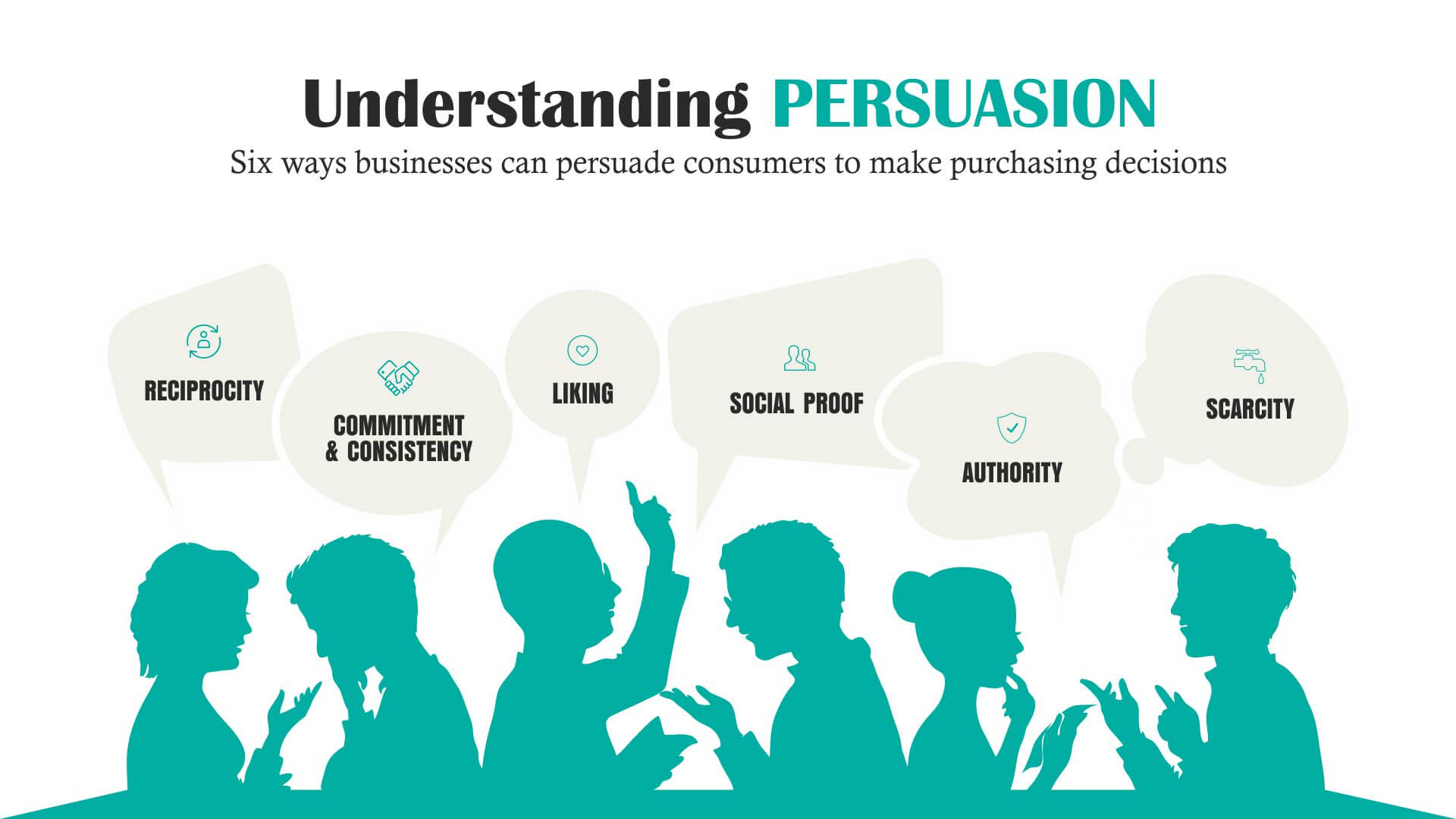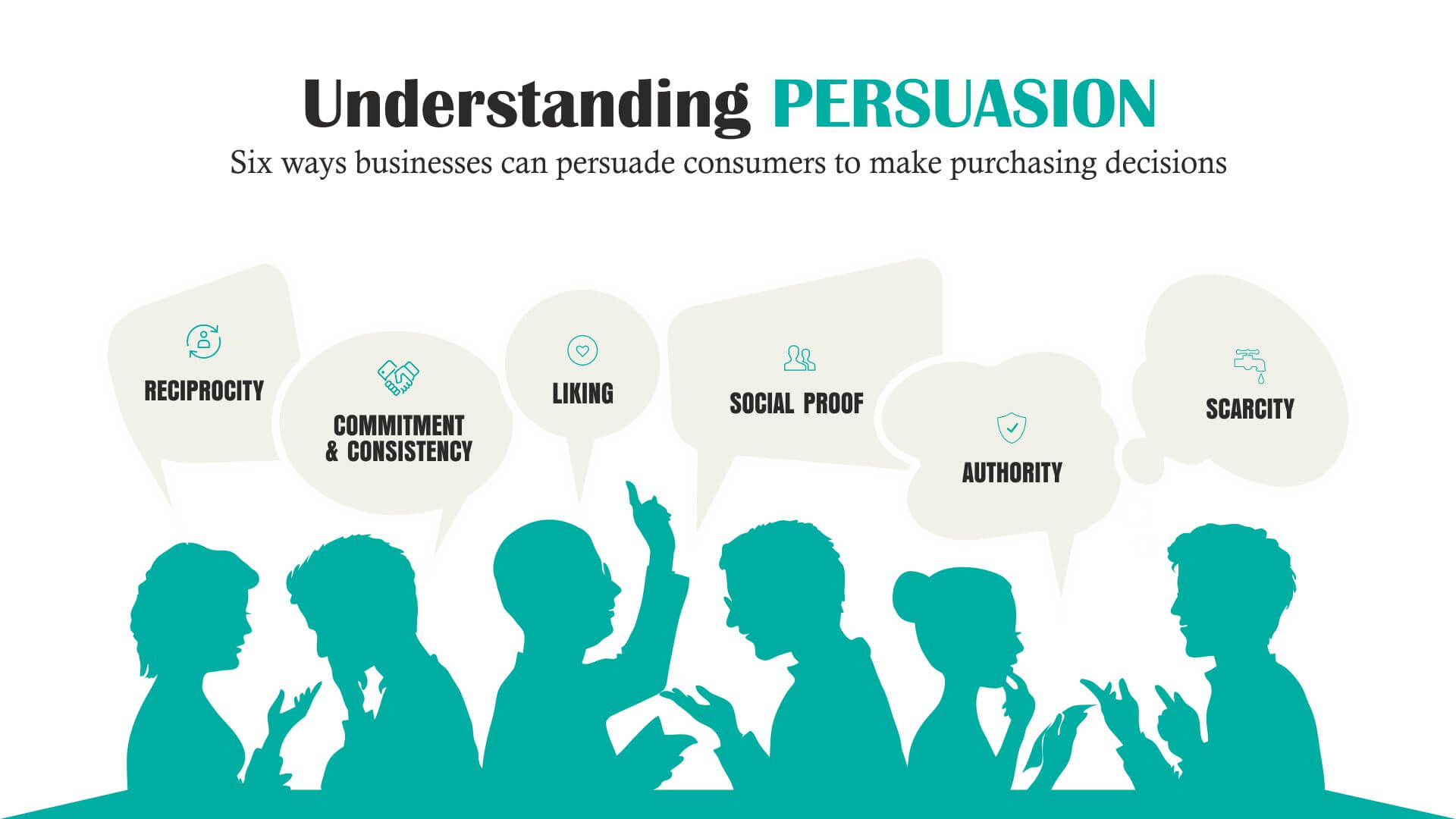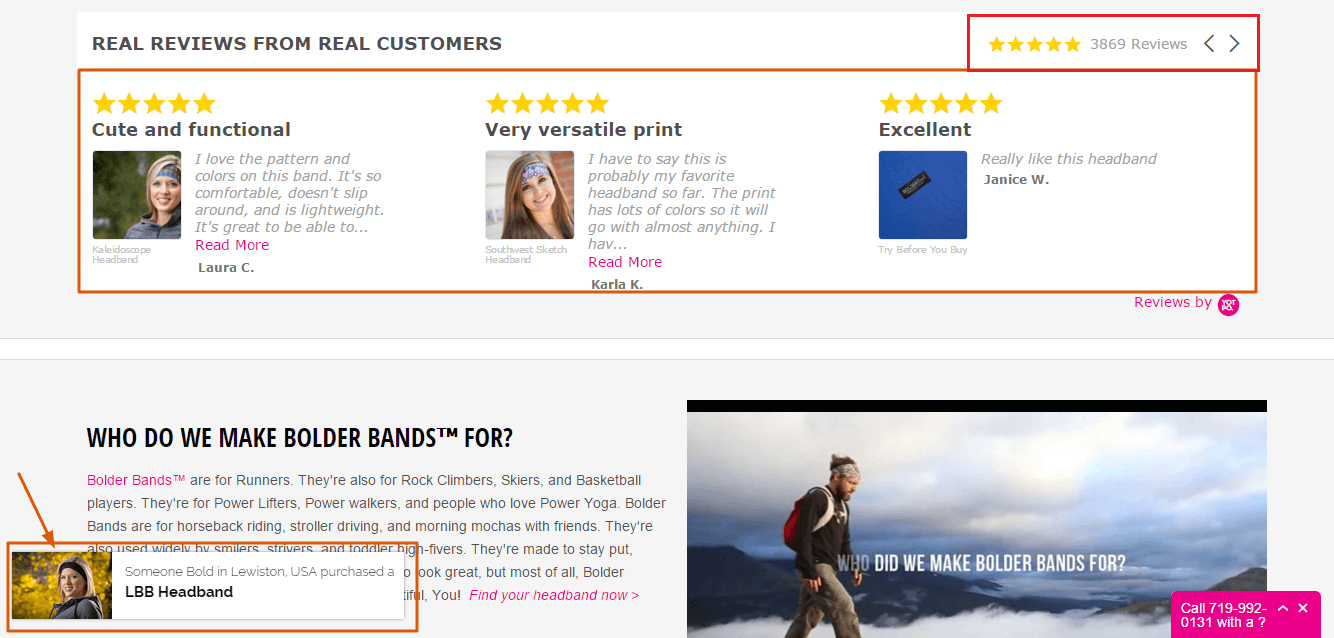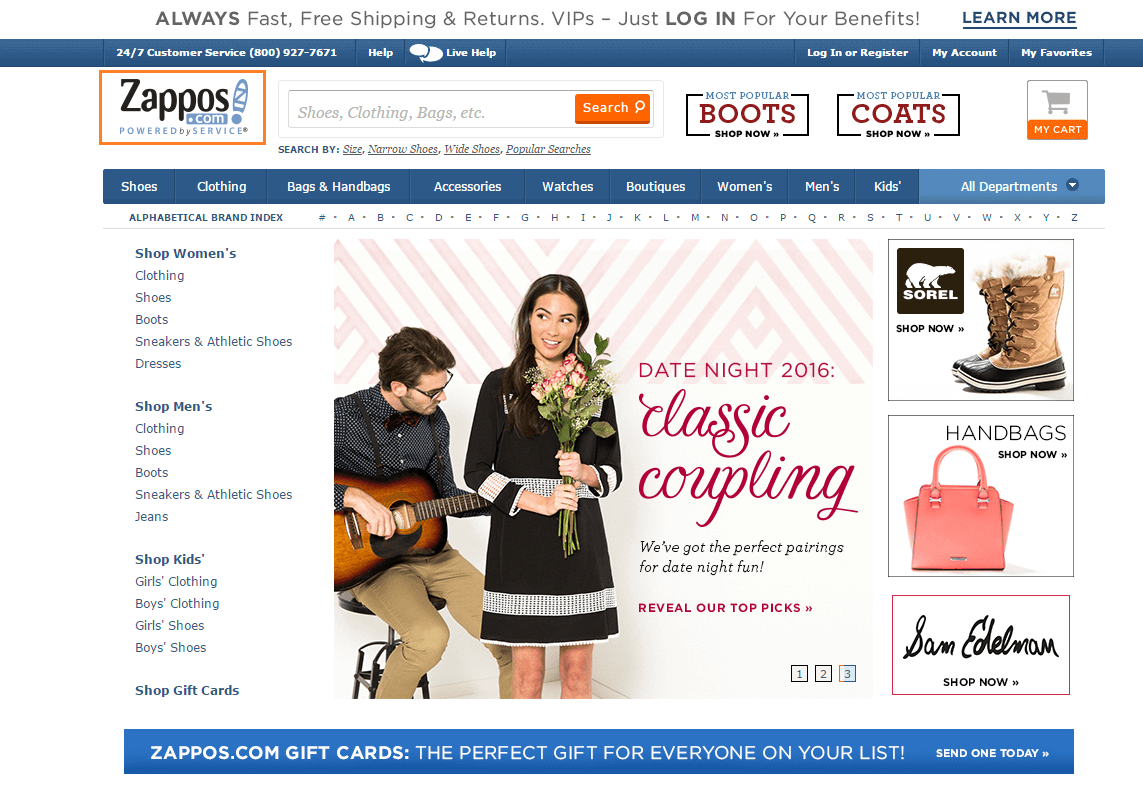
The power of persuasion separates the successful from everyone else. Persuading others isn’t luck or magic - it’s a science.
Persuasion is important, and well worth learning, for every human being and not just marketers or sales reps. It is a part of our daily lives. From persuading our families to go out to eat, persuading friends to go out for a movie or persuading interviewers in a job interview, it is pervaded in our lives.
As for any other business, persuasion plays an important role in e-commerce business as well. As an e-commerce retailer, your success depends on conversion rate (i.e. persuading visitors to buy from you) and lifetime value of a customer (i.e. persuading a customer to continue to buy from you over competitors).
When a visitor visits your e-commerce store, she has already demonstrated a very important characteristic just by being there; she has some kind of commercial intent.
Once she is on your e-commerce site, the ball is in your court. Are your offers and messages taking advantage of that and persuading visitors to become buyers?
Whether you agree or not, conversions are all about persuasions. Let’s have a look at the science behind persuasion and its impact on your e-commerce conversion rates.
Understanding persuasion
As Dr. Robert Cialdini, Psychology and Marketing at Arizona State University explained in his landmark book “Influence: The Psychology of Persuasion”, there are six ways businesses can persuade consumers to make purchasing decisions. These six ways are:
Reciprocity
Cialdini’s first principle, the “Idea of reciprocity” says that people by nature feel obliged to return favors. They like to treat others as they’ve been treated.
Commitment and Consistency
According to the Consistency and Commitment principle, people are more likely to do something after they have agreed to it verbally or in writing. People strive for consistency in their commitments because they associate the commitment with their self-image.
Social Proof
Cialdini defined social proof as a guide for the decisions and actions in situations where people are unsure of the correct way to behave. In short, people will do things that they see other people are doing.
Liking
The “Principle of Liking” explains, “If you like or follow someone, it will affect the chances of you being influenced by that person.”
Authority
This principle explains that people respect authority and obey authoritative figures even when asked to perform objectionable acts.
Scarcity
The last principle from Cialdini’s landmark persuasion principles is scarcity. It basically says the less there is of something, the more valuable it is. The more rare and uncommon a thing, the more people want it.
Yes, many have talked about these before, but they're so important that it's worth examining them again to see how you can apply them to your e-commerce environment.
Offer something for free (Principle of Reciprocity)
In e-commerce, there are a number of ways one can implement the principle of reciprocity.
First and foremost it is important to understand that in e-commerce, merchandise is not the only thing that has value. Information and expertise are extremely valuable. By creating a free newsletter, blog, or informative page, you can not only drive traffic to your website but also establish a feeling of indebtedness for valuable information.
One of the misunderstandings merchants have is that they consider free shipping as something that creates reciprocity. Free shipping was once a great example which developed reciprocity. As more and more e-commerce sites have adopted this method, free shipping is now somewhat expected and not considered a gift. As a result, customers do not feel any sense of indebtedness nor loyalty to a website that provides free shipping.
So, how can I implement the principle of reciprocity?
Don’t worry! There are many other ways you can implement the principle of reciprocity at your e-commerce store. One of the best ways of executing this principle is demonstrated by an online clothing store - BUNGALOW CLOTHING.
They don’t just have some real good collection of latest fashion clothing but they also understand the headaches and anxiety associated with the online shopping experience. To overcome this, as soon as a customer starts the shopping process, she is paired with one of their incredible personal stylists who work with her to deliver a dressing room right to your doorstep.
The catch here is:
- They provide their customers the option of “Try Before You Buy”.
- Free shipping both way and free return package pickup. Customers get the dressing room comfort right to their doorstep.
- No charges for the personal styling. Customers just need to pay the cost of cloth they buy.
Takeaways
Before you implement this principle, you need to ask yourself what you can offer in return to the customers for making such a big commitment to your brand. Customers are more likely to accept a series of small requests than one large one.
Bonus Tip:
Reciprocity isn’t only for conversion optimization; it can help you strengthen your social presence as well. Offer a small discount or a free gift on check out, then ask on the ‘Thank You’ page that the customer follows your brand on Facebook. You’ve just given them something and they’re more likely to complete that action.
You could also take this opportunity to ask for a review or social shares that can help you persuade and convert.
Win Commitment and Loyalty of your Customers (Principle of Commitment & Consistency)
The most proven way to earn customer loyalty is to ask your customer to start from a small action. This is known as the “foot-in-the-door” technique. Once they are in, they will feel an automatic compulsion to stick with it.
Online luxury store achica.com implemented this successfully. It is a member-only store and unlike other stores, one cannot see the product unless she is a member. This worked well for them as visitors who sign-up to become members end up buying a product from them.
Takeaways:
While implementing principle of commitment and consistency at your e-commerce store:
- Try to get the user to click on something on your site, then on another, and then on another. Each click is a tiny commitment. According to the principle of consistency, the visitor who clicks more, is more likely to buy.
- If you sell high priced products, first try to obtain a YES in smaller items. For example: try to get your potential customer to subscribe to your mailing list, to read one of your articles, or to watch one of your webinars. Then, the customer will feel much more “committed” to buying from you because of the principle of consistency.
Nothing draws a crowd quite like a crowd (Principle of Social Proof)
The Principle of Social Proof is a very important ingredient of e-commerce selling.
- Over 70% of Americans say they look at product reviews before making a purchase.
- Nearly 63% of consumers indicate they are more likely to purchase from a site if it has product ratings and reviews.
But social proof isn't as simple as putting up a 5-star rating on your website. And, it doesn’t end at just showing the customer reviews.
One of my favorite examples of a website that smartly implemented social proof is Bolder Band. Putting customer reviews has become a common thing and they understand it.
In 3 ways, they enforce the social proof on their website:
- Customer Reviews
- Total number of customer reviews
- The Special One: they flash a quick pop-up whenever there is a new sale happens at their store. (See the highlighted box and the bottom left of the image)
Takeaways:
Having social proof on your e-commerce site builds trust among new visitors. But before you set out to use social proofs, you should keep in mind these golden rules:
- Reviews are not considered as a unique social proof anymore — if you're going to use reviews on certain pages, it either has to be "hell yeah!" or no, meaning it should either wow customers or shouldn't exist at all.
- Try to use social proof in a unique way- the way Bolder Band does it by showing pop-ups for latest sale. The way Opower uses social proof to help reduce electricity consumption. All these unique ways help you stand out.
Make your store friendlier (Principle of Likability)
We tend to see people as likable for three reasons. They either look good (attractive), are similar to us, or they pay us compliments (they like or support us).
But do these factors apply to e-commerce?
Sure they do.
Everyone likes a neatly designed online store or a store offering products matching their interest. But, I personally feel there is no greater opportunity to get a customer to like you than when dealing with a customer complaint or question. This is your opportunity to really wow them.
One of the best example of using customer service to drive likability for you e-commerce store is Zappos.
They differentiate themselves with their customer service and if you notice, they mention it is their logo as well - “Powered by Service”. People simply love their customer service and it has earned them a stardom status in e-commerce.
Takeaways:
- Everyone wants to be liked! Figure out what makes people like your e-commerce website and you can begin to start realizing higher sales and profitability.
- The best way to learn this is to talk to your existing customers. Incentivize them and get on a call with them. This first-hand information will help you a lot in figuring out the real reason why people like your brand.
Establish Trust and Authority (Principle of Authority)
To get authority working for your e-commerce store, you need to focus on establishing credibility. When your site is viewed as credible, it holds more authority. This leads to shoppers feeling more comfortable shopping and makes it easier for your site to convert! Authority can be demonstrated from cues such as position (Dr., police, celebrity, etc.), clothing (a lab coat) or expensive items (luxury car).
Proactiv.com, an online portal offering products for acne treatment has nailed the principle of authority by using ‘Celebrity Stories’ to establish the credibility of their products.
Takeaways:
- It’s important to establish authority for your product or e-commerce website. But it’s even more important to ensure that your product/offering live up to its credibility.
- Be very sure while defining the authority for your e-commerce website. Because once it backfires, it gets very tough to overcome that.
Make your offering exclusive and limited (Principle of Scarcity)
People attach more value to things that are less in quantity. The fear of missing out (FOMO) is a powerful motivator for people and smart e-commerce marketers use this and other variety of tactics to create scarcity to drive more sales.
One of my favorite examples of an e-commerce website that has nailed the Principle of Scarcity is “The Fifth Watches”.
This Australian store combined exclusivity with scarcity and took it to some other level. It opens for only 5 days in a month and to buy your choice of watch, you need to be a part of their waitlist. Isn’t it uber cool?
Yes, it is.
Takeaways:
Scarcity is a powerful sales tool and can create a “Black Friday” effect. But before you set out to use any scarcity techniques, you should keep in mind these golden rules:
- Creating a sense of urgency through scarcity is a powerful motivator for your customers, but it’s also important to make sure that you communicate this scarcity effectively.
- Creating urgency is a subtle art. False urgency can backfire on you.
- Try not to overdo it. It can look untrustworthy and manipulative.
Final Word
The various principles of persuasion are powerful because they appeal to our subconscious instincts. However, do note that persuasion isn’t the result of a single optimized message, or even an offer that matches your visitor’s intent.
For e-commerce retailers, it means appealing to your customers on an emotional level. It means persuading each customer to take the next small step… and the next… and the next, until they ultimately convert and complete your desired action.
But, the biggest factor that ultimately drives customer satisfaction, loyalty and sales is a great product or offering. All marketing efforts will only work when they’re supporting a product that brings true value to customers.












Leave a reply or comment below